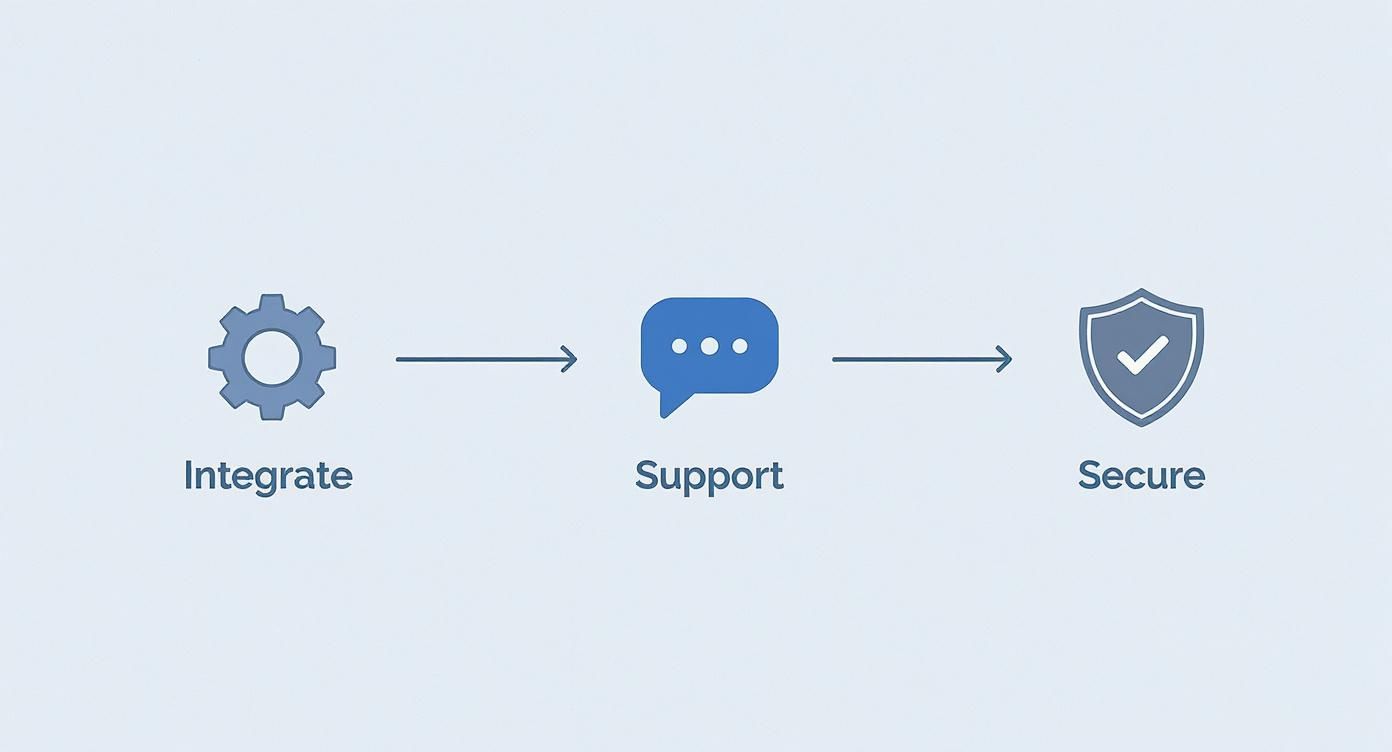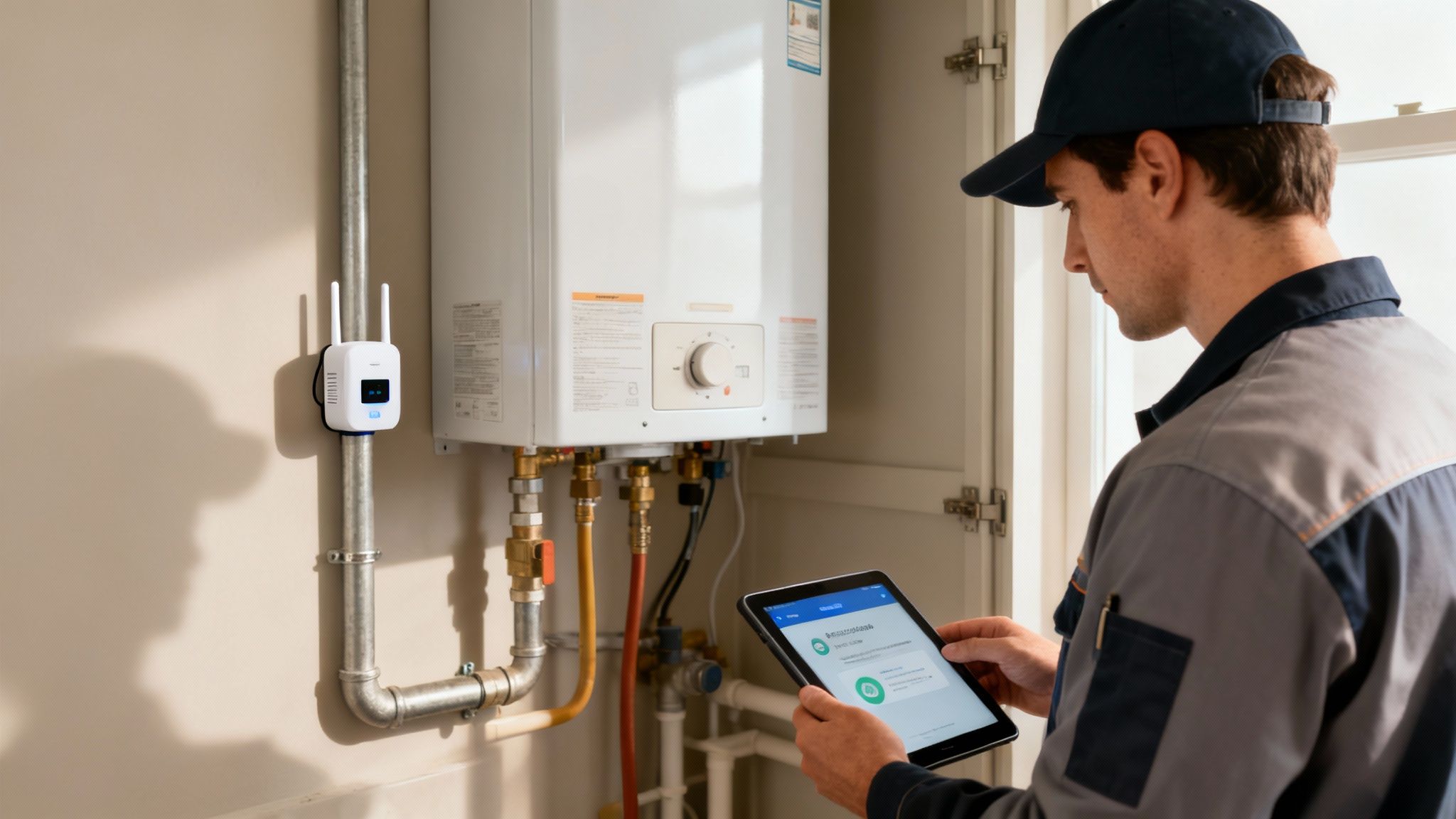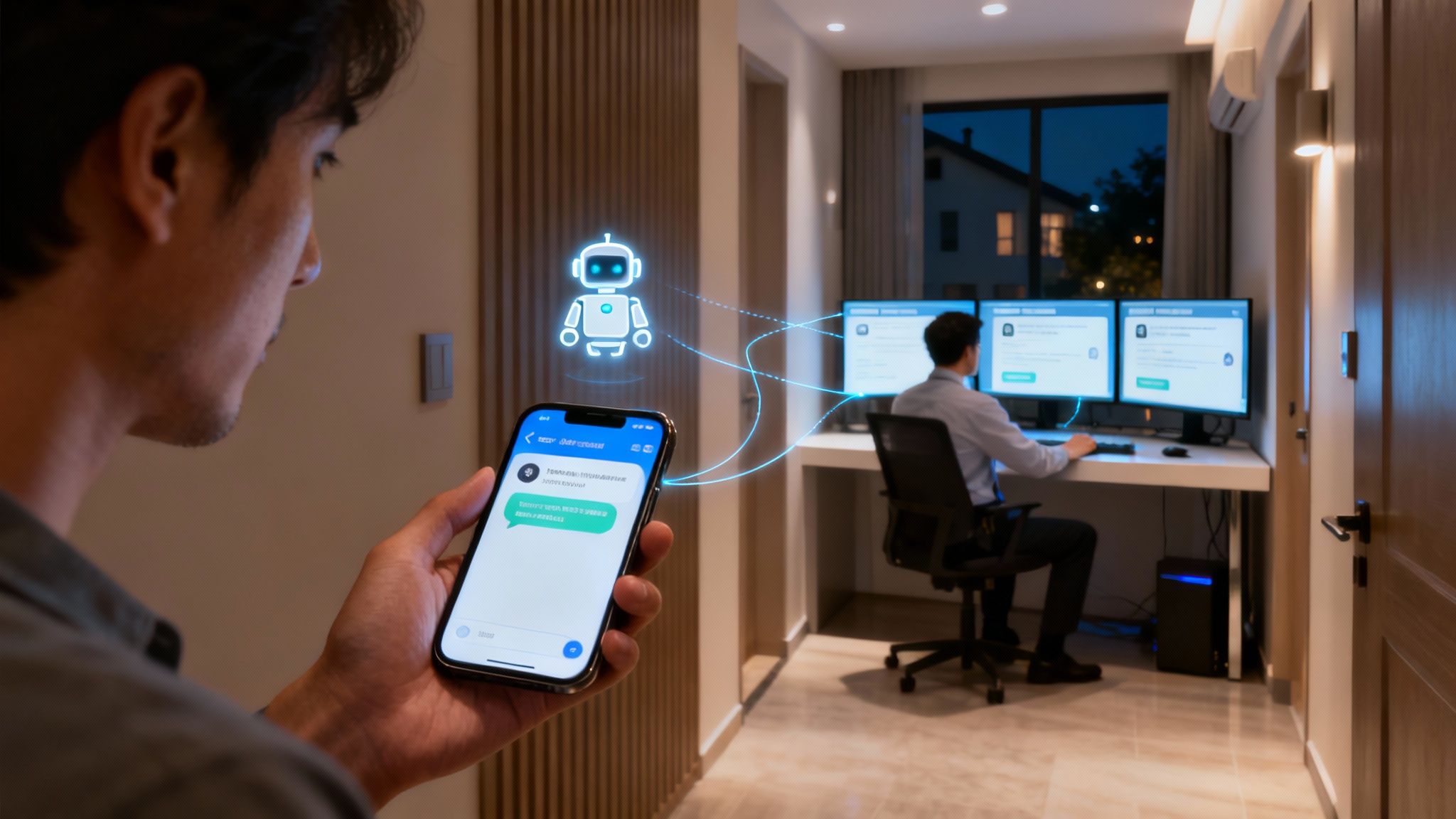Let's be real, offering 24/7 tenant support using AI isn't just some futuristic idea anymore—it's become a must-have for property managers who want to keep up. This is all about using smart technology to handle tenant enquiries, sort out maintenance requests, and deal with emergencies the moment they happen, no matter the time of day. The best part? It frees up your team to focus on the bigger picture.
Why 24/7 AI Tenant Support Is No Longer Optional
The old 9-to-5 property management model is struggling. We all know it. Today's tenants expect instant answers, whether they’ve got a leaky tap at 2 AM or a simple question about their rent on a public holiday. Making them wait until the office opens is a surefire way to get frustrated tenants and a string of bad reviews.
This shift in expectations means agencies have to adapt or get left behind. An AI-powered system gives you that crucial, always-on first point of contact, making sure no tenant request ever falls through the cracks.

It’s More Than Just Answering Calls
Now, the real power of AI here goes way beyond a fancy answering machine. To really get it, it helps to understand what is AI automation and how it’s a world away from those frustrating old phone menus.
Unlike a basic system that just directs calls, a proper AI assistant can:
- Triage Issues Intelligently: It knows the difference between a general question, an urgent repair, and a full-blown emergency. It only escalates what truly needs a human touch.
- Answer Common Questions Instantly: For things like "How do I pay my rent?" or "What's the go with pets?", the AI gives an immediate, correct answer straight from your agency's playbook.
- Capture Every Detail: When a tenant reports a maintenance issue, the AI is smart enough to ask follow-up questions, gather all the essential details, and create a complete work order for your team.
This kind of automation shifts your agency from constantly putting out fires to proactively managing your properties.
To see the difference in black and white, let's compare the old way with the new.
Manual vs AI-Powered Tenant Support
| Feature | Traditional Support (9-5 Human Staff) | AI-Powered Support (24/7 System) |
|---|---|---|
| Availability | Restricted to business hours, often 9 AM – 5 PM. | Always on, 24 hours a day, 7 days a week, including holidays. |
| Response Time | Can be instant during office hours, but significant delays overnight. | Immediate, automated responses to every single enquiry. |
| Issue Triage | Relies on a human operator to assess urgency, prone to error. | Intelligently categorises requests based on pre-set rules and keywords. |
| Cost | High ongoing salary costs for staff, plus after-hours call-out fees. | A predictable monthly subscription fee, much lower than staffing costs. |
| Data Capture | Manual note-taking can lead to incomplete or inconsistent details. | Captures structured, complete information for every request. |
| Scalability | Struggles to handle high call volumes, leading to missed calls. | Effortlessly manages hundreds of simultaneous conversations without delay. |
As you can see, the operational benefits are massive. Shifting to an AI system doesn't just improve tenant satisfaction; it completely reframes how your team spends their time.
The core benefit is freeing up your skilled property managers from repetitive, low-value administrative tasks. Instead of spending hours on simple phone calls, they can focus on building owner relationships, negotiating leases, and managing complex property issues.
This isn't just a theory; it's a trend that’s taking hold across Australia. In fact, a whopping 42% of real estate firms are already using AI to make their operations, including communication and maintenance, run smoother. These agencies are setting a new standard for service, and it's time to take notice. You can read more about these Australian tech trends for 2025.
Choosing the Right AI Platform for Your Agency
Picking the right technology partner is a massive decision when you're looking to bring in 24/7 tenant support property management with AI. The market is flooded with options, from basic chatbots that don't do much to complex AI assistants, and it’s way too easy to get lost in the tech-speak. Your goal isn’t just to find something that answers calls; you need a solution that actually slots into your agency’s day-to-day workflow.
The first thing to realise is that you need to look past simple FAQ bots. Sure, a basic chatbot can tell someone your office hours, but a proper AI assistant can handle far more detailed, multi-step conversations.
Think about a tenant reporting a blocked sink. A smart system won't just log the call. It will ask the right questions to figure out what's going on, determine if it's an emergency, and then create a detailed maintenance request—all without a human needing to step in.
Essential Features Your AI Partner Must Have
When you start looking at different platforms, focus on the features that will actually make a difference. A flashy dashboard is useless if the system doesn't cut down your team's workload or make your tenants happier.
Here’s what you should be prioritising:
- Deep PMS Integration: This is non-negotiable. The AI has to connect seamlessly with your Property Management Software, whether it's PropertyMe, Console Cloud, or something else. This connection lets it do things like verify tenant details, check rent balances, and log maintenance requests directly into your system, which means no more double-handling data.
- Intelligent Triage: The system needs to be smart enough to know the difference between a routine repair, an urgent issue, and a full-blown emergency. It should be able to escalate critical events—like a major flood or a fire—to your on-call team straight away, while handling the non-urgent stuff on its own.
- Multi-Channel Support: Tenants get in touch in all sorts of ways. Your chosen platform should meet them where they are, whether that's a phone call, an SMS, or a web chat. A single system that brings all these channels together is a game-changer for efficiency.
Beyond the Basics: What to Look For
Once you've ticked off the core features, it's time to dig a bit deeper to find a platform that can grow with your agency. This means getting specific with vendors and asking them about scalability, security, and the kind of support you'll get down the line. For a good sense of how specialised AI can be tailored for property, it's worth seeing how systems like vacation rental chatbots are built for very specific user needs.
One of the biggest differentiators is the ability to customise the AI's knowledge base. Your agency has its own way of doing things, right? The best platforms will let you 'train' the AI on your specific lease agreements, pet policies, and maintenance procedures. This ensures it gives accurate, branded responses every single time.
Finally, don't forget the human element. An AI platform should be a tool that empowers your team, not something that replaces them. As you check out your options, think about how an AI answering service can take the pressure off by handling the high volume of routine calls. This frees up your property managers to focus on what they do best: building relationships and solving complex problems. This blend of human expertise and AI efficiency is really the foundation of modern property management.
Getting Your AI Support System Up and Running
Rolling out a 24/7 tenant support system with AI isn't about some massive, overnight tech overhaul. It’s more of a smart, step-by-step process. The real aim is to build an assistant that feels like a natural part of your team—not a clunky robot that gets in your tenants' way.
The best place to start? Figure out what your tenants are actually asking.
Think about the top five questions that tie up your team’s phone lines every single day. Is it about rent payments? Maintenance requests? Or maybe it's the classic, "Can I get a cat?" These common queries are your launchpad. You’ll use them to build your first automated workflows, letting the AI handle the high-volume, simple stuff from day one. This gives your property managers their time back, straight away.
Start Small with a Phased Rollout
Instead of flipping a switch and unleashing this on your entire portfolio, ease into it. Kicking off with a pilot program for just one or two properties is by far the smartest way to go. This gives you a controlled, real-world testing ground to see how it performs and gather honest feedback from a small group of tenants and property managers.
This approach lets you spot and fix any little issues before you go all in. Maybe the AI’s answers about maintenance access are a bit stiff, or it doesn’t quite get some local slang. A pilot program uncovers these valuable nuggets, helping you fine-tune the system so it’s genuinely useful.
Of course, the tech behind this real-time interaction is no small thing. The rapid uptake of AI in Australian real estate is putting huge pressure on data centre capacity. As of 2025, Australia's live data centre capacity sat at around 1.4 gigawatts (GW) and is tipped to hit 1.8 GW within three years. This infrastructure is what makes instant, uninterrupted AI support possible, relying on serious cloud processing power to handle every tenant query. You can read more about Australia's data centre growth and its direct link to AI.
This infographic breaks down a simple way to look at the key parts of an AI platform.

As you can see, a successful rollout really comes down to how well the AI plays with your existing systems, the quality of support it delivers, and the security you have in place.
Train the AI to Sound Like You
An out-of-the-box AI will sound… well, like a robot. To make it a true asset, you need to 'train' it using your agency's own knowledge base and unique way of communicating. This just means feeding it your specific documents, like:
- Lease Agreements: So it can answer detailed questions about specific clauses.
- Pet Policies: So it knows the rules for each building.
- Maintenance Procedures: To walk tenants through lodging a request the right way.
When you do this, the AI learns to speak with your agency's voice, giving tenants consistent and accurate info that’s perfectly on-brand.
Honestly, the trickiest part of this whole process isn't the tech—it's the people. Your property managers need to see the AI as a helpful assistant that gets rid of boring, repetitive tasks, not as something that's here to replace them. Frame it as a tool that handles all the noise so they can focus on the important stuff, like building relationships with owners and tackling complex tenant problems.
Moving from Reactive Fixes to Proactive Maintenance
True innovation in property management isn't just about answering calls faster; it’s about stopping problems from happening in the first place. This is where a 24/7 tenant support property management with AI system really shines, moving beyond just communication and into proactive care.
It’s the ultimate shift from putting out fires to preventing them before they even start.

This evolution is all about predictive maintenance. By hooking your AI system up to the data from your building's assets, you suddenly gain the ability to spot trouble on the horizon. This isn't science fiction anymore; it’s a practical strategy that keeps tenants happy and saves owners a fortune.
How AI Predicts Building Issues
Let’s think about a hot water system in one of your properties. When you pair it with smart sensors (part of the Internet of Things, or IoT), your AI can monitor its performance in real-time. It doesn't just sit around waiting for the water to go cold; it actively looks for subtle signs of trouble.
The AI gets to work analysing patterns in the data, looking for things like:
- Irregular Energy Consumption: A sudden spike in power usage could easily signal a failing heating element.
- Pressure Fluctuations: Inconsistent water pressure might point to a slow leak or a valve that's on its way out.
- Temperature Deviations: If the system is struggling to hold a consistent temperature, that’s a massive red flag.
When the AI spots one of these anomalies, it doesn’t just ping you with a vague alert. It automatically logs a non-urgent maintenance request, schedules a technician during business hours, and lets you know what's been done. This simple, automated workflow is a core function of modern AI-driven property maintenance.
The result is powerful: you've just transformed a potential emergency call-out on a Saturday night—complete with premium labour costs and a furious tenant—into a planned, cost-effective service visit during the week. The tenant never even knew there was a problem.
This proactive approach is really taking off here in Australia. The local predictive maintenance market was valued at around USD 226.7 million, but with a compound annual growth rate of 32.4%, it's tipped to soar to USD 1.615 billion by 2030. This explosive growth is being driven by AI tools using data from IoT sensors to get ahead of failures in everything from HVAC units to elevators, stopping them before they become costly emergencies.
A Real-World Predictive Maintenance Scenario
Let's walk through exactly how this plays out for an air conditioning unit during a scorching summer heatwave. It’s simpler than you might think.
- Data Monitoring: An IoT sensor on the building’s main HVAC unit is constantly feeding performance data to your AI system, tracking key metrics like coolant levels and compressor run times.
- Anomaly Detection: The AI flags that the compressor is running 15% longer than average to cool the building. It recognises this as a classic sign that the unit is working too hard, likely due to low refrigerant or a blocked filter.
- Automated Action: Instead of waiting for the unit to conk out, the AI automatically creates a work order in your property management system. It flags the job as "Preventative Maintenance" and attaches all the diagnostic data it gathered.
- Smart Scheduling: The system then checks the availability of your preferred HVAC technician and schedules a visit for the next business day, neatly sidestepping those eye-watering emergency call-out fees.
- Resolution: The technician arrives, gives the filters a clean, and tops up the refrigerant. A major breakdown is completely avoided, and the tenants carry on enjoying a cool building without any disruption.
Right, so you’ve got your AI system up and running. Job done? Not even close.
Getting the AI live is just the first step. To really make the most of your 24/7 tenant support property management with AI, you need to keep a close eye on what’s working and what’s falling flat. This isn't about getting lost in a spreadsheet full of numbers; it's about focusing on the metrics that actually matter to your day-to-day operations.
The best insights come from seeing real, tangible changes in how your team works. We need to go beyond just counting calls and start measuring the genuine efficiency gains. This is how you turn a nifty AI tool into an absolute game-changer for your agency.
How to Know if It’s Actually Working
Before you even switch the AI on, you need to get a baseline. Know your numbers now so you can measure the difference later. The goal is to see a clear, positive shift in how your team operates and, just as importantly, how your tenants feel.
Here are the key things you should be tracking:
- A Drop in After-Hours Calls: This is your first big win. You need to see a real reduction in the calls your team is forced to deal with at night and on weekends. If that number goes down significantly, you know the AI is doing its job.
- First-Contact Resolution: What percentage of tenant problems is the AI sorting out on its own, without having to handball it to a person? You want to see this number steadily climbing as you fine-tune the system.
- Average Time to Resolution: How long does it take to get a tenant's issue sorted from the moment they first reach out? For all the common, simple requests, AI should be slashing this timeframe.
These figures give you a black-and-white picture of your return on investment. If you're keen to dig even deeper into tracking team performance, our guide on essential communication metrics has some great frameworks you can adapt.
Making Your AI Smarter Over Time
Your AI isn’t a set-and-forget tool. It learns and gets better, but only if you give it some attention.
Block out some time each month to actually read through a sample of the conversations between your AI and your tenants. I know, it sounds tedious, but this is where the gold is. This simple audit will help you spot patterns and find easy ways to make it better.
For instance, you might notice the AI gets stumped every time a tenant asks about renewing their lease. That's your cue. Jump in and update its knowledge base with the exact scripts, key dates, and steps from your agency’s renewal process. By feeding it that specific info, you’re training it to handle those conversations perfectly next time.
Think of your AI as a new junior property manager. At the start, they need clear instructions and training. By regularly checking in, seeing where they're struggling, and giving them better information, you help them grow from a basic helper into an expert who really gets your agency and your tenants.
This cycle of measuring, reviewing, and tweaking is what ensures your AI support doesn't just stagnate. It grows right alongside your business, becoming a smarter, more valuable part of the team over time.
Your Top AI Questions, Answered
Jumping into any new tech brings up some fair dinkum questions, and shifting to 24/7 tenant support with AI is no different. I get it. Property managers are often wondering about the practical side of things—how much it costs, if it’s secure, and whether a machine can genuinely represent their agency’s hard-earned reputation for great service.
Let’s tackle these common worries head-on.
One of the first things that comes up is always data security. Where does all the tenant information go, and is it actually safe? Any reputable AI platform will use serious encryption and be built on secure cloud infrastructure—often the same type of tech the big banks use.
When you're looking for a partner, always ask to see their data handling policies. You need to be sure they’re compliant with Australian privacy laws, no ifs or buts.
Another big one is the cost. Sure, there’s an initial setup and a monthly subscription, but you've got to weigh that against what you're already spending. Think about the team's hours chewed up by answering the same old calls, the cost of after-hours answering services, and the financial hit of a single missed emergency maintenance job.
For many agencies, an AI system that knocks over 300 calls per month off the team's plate delivers a clear and seriously fast return on investment.
Can an AI Really Sound Like My Agency?
This is a big one, especially for agencies that have built their reputation on personal, friendly service. The good news is that a modern AI assistant isn't some generic, monotone robot. You can actually customise its entire knowledge base with your agency’s specific policies, procedures, and even its unique tone of voice.
The goal isn't to trick tenants into thinking they're talking to a human. It's about giving them instant, accurate, and professional answers that reflect your brand standards—ensuring total consistency, whether it's 3 PM on a Tuesday or 3 AM on a Sunday.
This level of customisation makes the AI feel like a natural extension of your team, not just a bit of software.
What if the AI Gets It Wrong?
Look, no system is perfect. But a smart AI is designed to know its own limits.
If it gets hit with a complex or fuzzy query it can't answer with 100% confidence, its number one job is to immediately escalate the issue to a human property manager. Simple as that.
This built-in safety net guarantees that the tricky situations always get the expert attention they need. The AI handles the high volume of simple, repetitive stuff, freeing up your skilled team to manage the exceptions. It’s a powerful partnership between technology and your own human expertise.
Ready to see how an AI assistant can handle your calls and free up your team? OnSilent provides a smart, customisable solution designed for busy property managers. Stop missing calls and start delivering exceptional 24/7 service. Explore the future of property management at https://onsilent.com.

